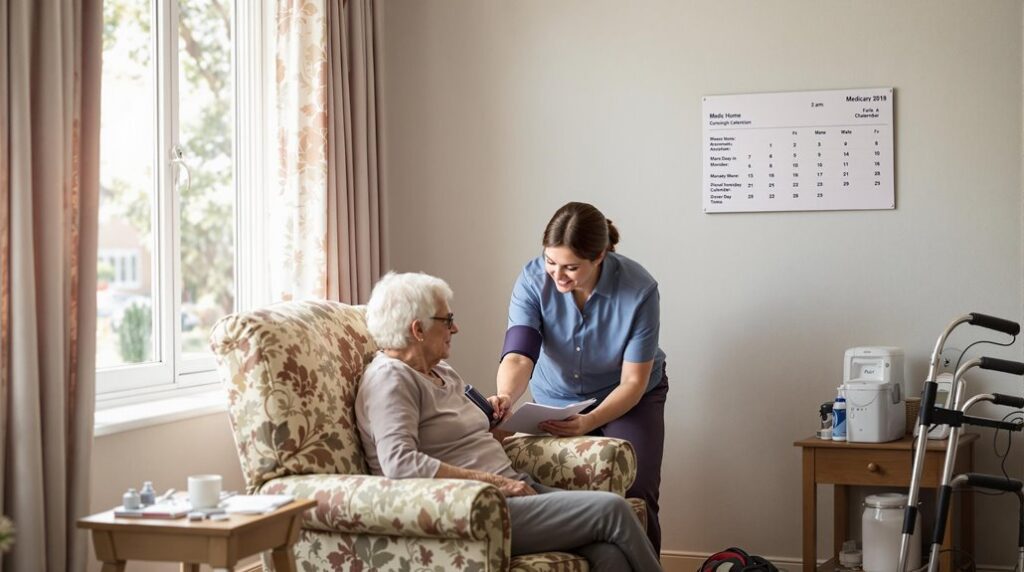Medicare will cover your home health care services for as long as you meet eligibility requirements and remain under a doctor’s care. You’ll need to be homebound and require skilled nursing or therapy services. Your doctor must recertify your need for care every 60 days, and services must come through a Medicare-certified agency. While there’s no time limit, several key factors determine how long your coverage continues.
Medicare Home Health Care Eligibility Requirements
Four key requirements must be met to qualify for Medicare home health care.
First, you need to be under a doctor’s care with a documented care plan that’s regularly reviewed.
Second, your doctor must certify that you’re homebound, meaning leaving home requires considerable effort.
Third, you must require skilled nursing care, physical therapy, speech therapy, or occupational therapy on an intermittent basis.
Fourth, you must receive services from a Medicare-certified home care agency.
These eligibility criteria guarantee that you receive appropriate care while protecting Medicare resources.
If you’re helping a loved one navigate these requirements, remember that documentation from healthcare providers is essential.
Being proactive in gathering medical records and maintaining regular communication with doctors will streamline the qualification process.
Medical social services can help connect seniors with additional resources and provide emotional support during the qualification process.
Understanding the Medicare Home Health Benefit Period
Medicare’s home health benefit period begins once your doctor certifies your need for skilled care and continues for 60 days. During this time, you’ll receive necessary home health services based on your care plan, with no limits on the number of visits as long as they’re medically required.
If you still need care after 60 days, your doctor can recertify your need for another benefit period. There aren’t any benefit limits on how many 60-day periods you can receive, provided you continue meeting eligibility requirements.
Your doctor will regularly review your progress to determine if home health services should continue or if adjustments to your care plan are needed.
Remember that Medicare only covers home health care that’s part-time or intermittent, and your condition must be expected to improve with skilled care.
Payment plan options are available to help cover any out-of-pocket costs not covered by Medicare benefits.
Types of Home Health Services Covered by Medicare
When you qualify for home health care, understanding the specific services Medicare covers will help you make the most of your benefits.
Medicare covers several essential home health service types, including skilled nursing care, physical therapy, occupational therapy, and speech-language pathology services.
You’ll also receive coverage for medical social services, which help with emotional concerns and community resource planning.
Part-time or intermittent home health aide services are covered when you need help with personal care, like bathing or dressing.
Medicare also pays for necessary medical supplies and equipment your doctor orders as part of your care plan.
For all these services to be covered, they must be ordered by your doctor and provided through a Medicare-certified home health agency.
Your care must be reasonable and necessary for treating your condition.
Skilled nurses provide expert wound care and monitoring to prevent post-surgical infections and complications.
Key Factors That Affect Coverage Duration
Several critical factors determine how long your Medicare home health coverage will last, including your doctor’s certification of need, the stability of your medical condition, and your progress toward treatment goals.
Your doctor must regularly review and recertify your need for home health services, typically every 60 days. Medicare will continue coverage as long as you remain homebound and require skilled care.
Medicare home health coverage requires doctor recertification every 60 days and continues while you’re homebound needing skilled care.
However, coverage limits may apply if your condition stabilizes or you no longer show improvement with treatment.
Your engagement in the prescribed care plan greatly impacts coverage duration. If you consistently participate in therapy and follow medical recommendations, you’re more likely to maintain coverage.
Medicare may reduce or terminate services if you’ve reached maximum improvement or can safely shift to non-skilled care.
Temporary care options are available through Medicaid home health services for those who need additional support after Medicare coverage ends.
Documentation and Certification Process
Obtaining Medicare coverage for home health care requires thorough documentation and certification from your healthcare providers.
The documentation process involves detailed records that demonstrate your need for skilled care and your homebound status. Your doctor will work with the home health agency to meet certification requirements.
You’ll need to complete these key steps:
- Get a face-to-face evaluation with your doctor within 90 days before or 30 days after starting home health care.
- Have your doctor complete and sign a certification form detailing your medical condition and care plan.
- Verify your home health agency submits all required documentation to Medicare, including the plan of care and ongoing progress notes.
Regular recertification is necessary every 60 days to maintain coverage if you continue to qualify for services.
For those unable to qualify for Medicare, long-term care insurance may be available as an alternative payment option for home health services.
When Medicare Home Health Coverage Stops
Medicare may stop covering your home health care services once you no longer meet specific eligibility requirements. Your coverage ends when you’re no longer homebound, don’t need skilled nursing care, or can safely receive treatments at an outpatient facility.
A home health discharge occurs when you’ve reached your treatment goals or your condition has stabilized. Coverage limitations also apply if you require more than part-time or intermittent care.
Your doctor and home health agency must notify you before discontinuing services.
Healthcare providers must give advance notice before ending any home health services to ensure proper care transition.
If you disagree with the decision to end your home health care, you have the right to appeal. Request an expedited appeal through your Quality Improvement Organization within 72 hours of receiving the discharge notice to guarantee your services continue during the review process.
Conclusion
Medicare covers home health care for as long as you need it – there’s no fixed time limit. Think of it like having a safety net that stays with you on your care journey. Your doctor simply needs to confirm you still need care every two months, much like checking in with a trusted friend. As long as you’re unable to leave home easily and need skilled medical care, Medicare continues its support.
Keep good records of your care – it’s like creating a clear roadmap of your health story. Stay in touch with your nurses and doctors who are there to guide and support you through each step. Remember, you’re not walking this path alone. Many seniors just like you navigate these waters successfully every day.
Your health and comfort matter, and the right support can make all the difference in your care journey. If you or a loved one need help, don’t wait. Reach out to Focus Family Care today at (561) 693-1311 or email us at info@focusfamilycare.com.





